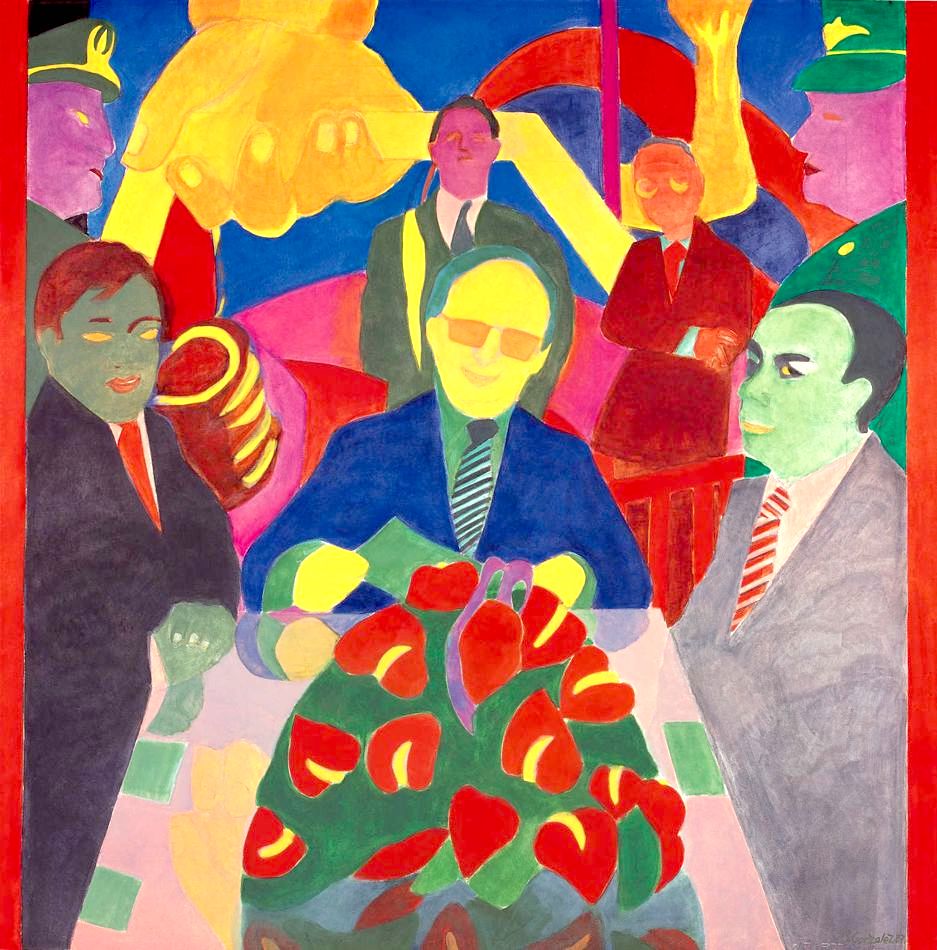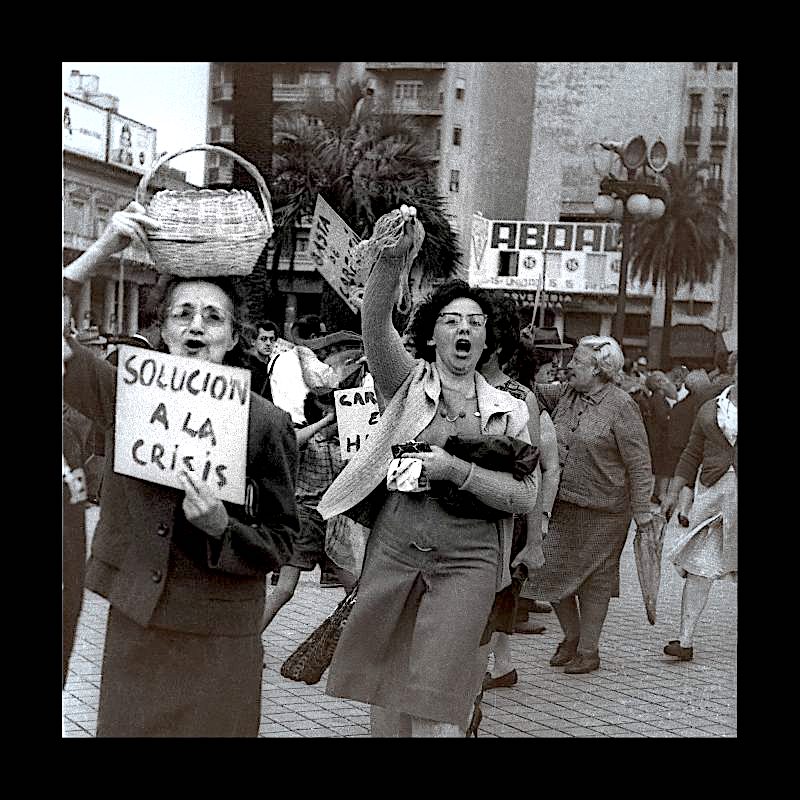The U.N. development forum ending on Thursday brings to mind the aspiration that Colombia’s President Petro expressed last year for humanity to “live far from the apocalypse and times of extinction.”

Marisa Darasavath, Lao People’s Democratic Republic, “Oil Painting #7,” 2013.
By Vijay Prashad
Tricontinental: Institute for Social Research
 There are times in life when you want to set aside complexity and return to the essence of things. Last week, I was on a boat in the Caribbean Sea, travelling from Isla Grande to the mainland of Colombia, when it began to rain heavily.
There are times in life when you want to set aside complexity and return to the essence of things. Last week, I was on a boat in the Caribbean Sea, travelling from Isla Grande to the mainland of Colombia, when it began to rain heavily.
Though our boat was modest, we were in minimal danger with Ever de la Rosa Morales, a leader of the Afro-Colombian community on the 27 Rosario Islands, off the coast of Cartagena, at the helm.
During the downpour, a range of human emotions swept through me, from fear to exhilaration. The rain was linked to Hurricane Beryl, a storm that struck Jamaica at a Category Four level, the highest the country has experienced, and then moved toward Mexico with a more muted ferocity.
The Haitian poet Frankétienne sings of the “dialect of lunatic hurricanes,” the “folly of colliding winds” and the “hysteria of the roaring sea.”
These are fitting phrases to describe the way we experience the power of nature, a power that has redoubled as a result of the damage inflicted upon it by capitalism.
The Intergovernmental Panel on Climate Change’s Fifth Assessment Report suggests that the North Atlantic has almost certainly experienced stronger and more frequent hurricanes since the 1970s. Scientists say that long-term greenhouse gas emissions have led to warmer ocean waters, which pick up more moisture and energy and lead to both stronger winds and more rainfall.
On Isla Grande, where pirates used to stash their loot and where Africans escaping enslavement fled over 500 years ago, residents held an assembly in early July to discuss the need for an electricity plant that would benefit the islanders.
The assembly is part of a long struggle that ultimately allowed them to remain on these islands, despite the Colombian oligarchy’s attempt to evict them in 1984, and succeeded in removing the rich owner of the best land on Isla Grande, upon which they built the town of Orika through a process called minga, or community solidarity.
Their Community Action Board, Junta de Acción Comunal, which led the struggle to defend their land, is now called the Community Council of the Rosario Islands, Consejo Comunitario de las Islas del Rosario. Part of that council held the assembly, an example of the permanent minga.
The island is knit together by this spirit of minga and by the mangroves, which preserve the habitat from the rising waters. The assembled residents know that they must expand their electricity capacity, not only to promote eco-tourism, but also for their own use. But how can they generate electricity on these small islands?
On the day of the rains, Colombian President Gustavo Petro visited the town of Sabanalarga (Atlántico) to inaugurate the Colombia Solar Forest, a complex of five solar parks with a capacity of 100 megawatts. This park is set to benefit 400,000 Colombians and cut annual CO2 emissions by 110,212 tonnes, which is equivalent to 4.3 million car trips from Barranquilla to Cartagena.
At this event, Petro called on mayors in the Colombian Caribbean to build 10-megawatt solar farms for each municipality, reduce electricity rates, decarbonise the economy, and promote sustainable development. This is perhaps the most concrete solution for the islands to date, whose coastlines are being eroded by the rising waters.

Beatriz González, Colombia, “Señor presidente, qué honor estar con usted en este momento histórico” or “Mr President, What an Honour to Be with You in This Historic Moment,” 1987.
As Petro spoke in Sabanalarga, I thought about his speech to the United Nations last year, where he pleaded for world leaders to honour the “crisis of life” and fix our problems together rather than “waste time killing one another.”
In that speech, Petro lyrically described the situation in 2070, 46 years from now. In that year, he said, Colombia’s lush forests will become deserts and “people will go north, no longer attracted by the sequins of wealth, but by something simpler and more vital: water.”
“Billions,” he said, “will defy armies and change the Earth” as they travel to find the remaining sources of water.
Such a dystopia must be prevented. To do so, Petro said, at the very minimum sufficient funding must be provided for the 17 Sustainable Development Goals (SDGs), established by a treaty in 2015.
While the entire process of developing these SDGs was fraught with problems, including how they disarticulate issues that are inextricably connected — poverty and water, for instance — their existence and acceptance by world governments provides an opportunity to insist that they be taken seriously.
On July 8, the United Nations Economic and Social Council opened the 2024 High-Level Political Forum on Sustainable Development, which will last for 10 days.
The gap between the funds pledged to meet the SDGs and the actual amount provided to implement the programme in developing countries is now $4 trillion per year, up from $2.5 trillion in 2019. Without sufficient funding, it is unlikely that this forum will have any meaningful outcome.
In anticipation of the forum, the U.N. released the “Sustainable Development Goals Report 2024,” which shows that only “minimal or moderate” progress has been made toward nearly half of the 17 targets, and more than a third have either stalled or regressed.
While the first sustainable development goal is to eradicate poverty, for instance, the report notes that “the global extreme poverty rate increased in 2020 for the first time in decades” and that by 2030, at least 590 million people will be in extreme poverty and fewer than 1-in-3 countries will halve national poverty.
Similarly, while the second goal is to end hunger, in 2022 1-in-10 people faced hunger, 2.4 billion people were moderately or severely food insecure, and 148 million children under the age of five suffered from stunting.
These two goals, ending poverty and ending hunger, are perhaps the ones with the highest global consensus. And yet, we are nowhere near meeting even a modest interpretation of these goals.
Ending poverty and hunger would also assist in the fifth SDG, gender equality, since it would reduce the increased burden of care work placed mostly on women, who largely bear the weight of austerity policies.
There is, as President Petro said, a “crisis of life.” We seem to favour death over life. Each year, we spend more and more on the global military. As of 2022, this number was $2.87 trillion — nearly the amount needed to finance all 17 SDGs for one year.
It is strange how the advocates of a planet at war claim that they are realistic, while those who want a planet of peace are seen as idealists; yet, in fact, those who want a planet of war are exterminators, while those of us who advocate for a planet of peace are the only possible realists.
Reality demands peace over war, spending our precious resources to solve our common problems — such as climate change, poverty, hunger, and illiteracy — above all else.
In September 2023, a month before the current genocidal assault against Gaza began, Petro called for the U.N. to sponsor two peace conferences, one for Ukraine and one for Palestine. If there can be peace in these two hotspots, Petro said, “they would teach us to make peace in all regions of the planet.”
This perfectly reasonable suggestion was ignored then and is ignored now. Nonetheless, this did not stop Petro from organising a massive Latin American concert for peace in Palestine in early July.

Rosângela Rennó, Brasil, from the series “Rio-Montevideo,” 2016.
There is madness in our choices. The revenues of the top five arms dealers in 2022 alone (all domiciled in the United States) were around $276 billion, a number that should be a standing rebuke to humanity. Israel has dropped roughly 13,050 MK-84 “dumb bombs” on Gaza, which have an explosive capacity of 2,000 pounds (around 900 kgs) per bomb.
Each of these bombs costs $16,000, meaning that the bombs already dropped have cost over $200 million in total. It is strange that the very governments that supply Israel with these bombs and that give it political cover (including the U.S.) then turn around and fund the U.N. to dismantle unexploded dumb bombs from Gaza during the pause between bombings.
Meanwhile, aid for relief and development in the Occupied Palestinian Territory (which includes Gaza) has not exceeded hundreds of millions — in a good year. More spent on weapons, less spent on life – the ugliness of our humanity needs to be transformed.

Mohamed Sulaiman, Western Sahara, “Red Liberty,” 2014.
The young artist Mohamed Sulaiman grew up in Algeria, at the Smara Refugee Camp of the displaced peoples of Western Sahara. After studying at Algeria’s University of Batna, Sulaiman returned to the camp to make art based on calligraphy traditions that use the oral histories of the Saharawi people as well as poems of contemporary Arab writers.
In 2016, Sulaiman founded the Motif Art Studio, built from recycled materials to resemble traditional desert homes. In his studio, which opened in 2017, Sulaiman hangs “Red Liberty,” which carries a line from the Egyptian poet Ahmad Shawqi (1868–1932): “Red freedom has a door, knocked on by every bloodstained hand.”
The line comes from “The Plight of Damascus,” a poem that reflects on the French destruction of Damascus in 1916 as revenge for the Arab revolt. The poem encapsulates not only the ugliness of the war, but also the promise of a future:
Homelands have a hand that has already lent a favour
and to which all free people owe a debt.
The bloodstained hand is the hand of those before us who struggled to build a better world, many of whom perished in that struggle. To them, and future generations, we owe a debt.
We must turn this “crisis of life” into an opportunity to “live far from the apocalypse and times of extinction,” as Petro said last year; “A beautiful horizon [is coming] amidst the storm and darkness of today, a horizon that tastes like hope.”
Vijay Prashad is an Indian historian, editor and journalist. He is a writing fellow and chief correspondent at Globetrotter. He is an editor of LeftWord Books and the director of Tricontinental: Institute for Social Research. He is a senior non-resident fellow at Chongyang Institute for Financial Studies, Renmin University of China. He has written more than 20 books, including The Darker Nations and The Poorer Nations. His latest books are Struggle Makes Us Human: Learning from Movements for Socialism and, with Noam Chomsky, The Withdrawal: Iraq, Libya, Afghanistan and the Fragility of U.S. Power.
This article is from Tricontinental: Institute for Social Research.
Views expressed in this article may or may not reflect those of Consortium News.


Thank you for this peace message from a rare sane leader. And thank you for the art you bring from all over this world.
The ICC needs to be petitioned to prosecute all illegal weapons dealings, rather by individuals, manufacturers, or governments. The death tolls and collateral destruction of the environment, due to the global absence of the legal restraints on arms distribution, can not be resolved by political rhetoric.
As Usual,
EA
Where do these governments think they’re going with war on a finite planet? Do they take the future for granted, or even think about it?
It is the tiny number of people behind those governments that pull the strings. Those individuals probably think they do know the risks, and even believe they can control and contain them. Extremely dangerous thinking, in my view.
They may even delude themselves that they are doing all of these incredibly dangerous things for the ultimate good of the planet (and themselves, of course).
But they clearly have little regard for the death, destruction and suffering they cause. They have zero empathy, zero compassion, and zero morals. They, just like their puppets in government & industry, are not constrained by ethical or moral considerations.
They consider themselves above all laws, godlike, entitled, and right.
They are insane.
My name is Sweet. I second everything Joy wrote. Peace is the opportunity for more sweet joy, isn’t it? A remarkable man, Petro, His lyric expressiveness authenticates the depth of his spirit. A rare bird among the Fraternity of the world’s leadership. May he, Columbia ‘s people, and those who hear his sane message thrive in putting strong grounded legs and supple hands and thinking hearts to realizing his deep desires for a life serving humanity. Fulsome gratitude for this opportunity to see such lively art.
Thank you for these voices and views of a better world. We need to hear and see more of them, and more like them.